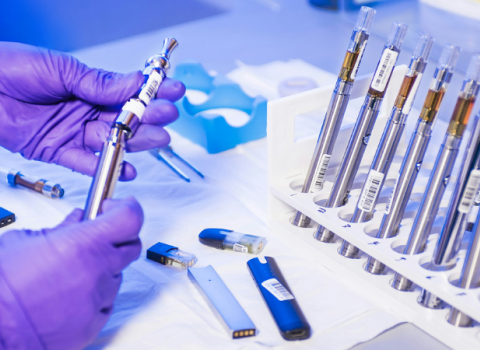Industry has welcomed the European Commission’s biotechnology and biomanufacturing initiative, but now wants to see some action

Margrethe Vestager presenting the Commission’s biotechnology and biomanufacturing initiative on 20 March. Photo credits: Aurore Martignoni / European Union
The European Commission is to look into how to speed up approvals for biotechnology, with a view to launching an EU Biotech Act in the next mandate, executive vice president Margrethe Vestager has announced.
“Europe will not be attractive to businesses worldwide if permitting and other administrative procedures take much longer than in other parts of the world,” she said, presenting the Commission’s biotechnology and biomanufacturing initiative on 20 March.
In the meantime, it will establish an EU biotech hub by the end of this year, “to enable biotech firms to better understand existing regulation,” she said. The sector is already set to benefit from streamlined permitting procedures under the Net-Zero industry Act.
Applications of biotechnology and biomanufacturing range from replacing fossil fuels, to the discovery and development of new drugs for rare diseases, and bio-based alternatives to plastic and other materials. The EU funds research in the sector predominantly through the Circular Bio-based Europe Joint Undertaking (CBE JU), and more support is needed to help innovators scale up their technologies in Europe.
Regulatory complexity is one of three key obstacles to European competitiveness the new plan aims to address, alongside access to finance, and difficulties moving from research to the market.
The Commission is promising to review its Bioeconomy Strategy by the end of 2025, which could include a stronger industrial dimension.
To help companies scale up, the Commission will advocate for the inclusion of specific challenges on biotech and biomanufacturing in the European Innovation Council (EIC) accelerator work programme for 2025.
“Europe cannot remain only a fantastic cradle of ideas for the rest of the world. What is born here should also have the opportunity to grow here,” Vestager said.
To support the uptake of bio-manufactured products, the Commission will conduct an impact assessment for bio-based requirements in public procurement. It will further develop methodologies to ensure a fair comparison between fossil-based and bio-based products, as the latter are usually more expensive and their environmental benefits are not always apparent to consumers.
The EU is also betting on the potential of artificial intelligence to help companies scale up their operations. The €500 million GenAI4EU initiative aims to stimulate the uptake of generative AI in industries including biotech and biomanufacturing, and the Commission wants to give biotech firms access to EuroHPC supercomputers.
“We want to make Europe a global biotech leader,” said Vestager. “With the potential to solve some of our most pressing problems, biotechnology also largely supports Europe’s economy, and it provides high-quality jobs.”
Biotechnology can also pose a risk due to its dual-use potential, and the Commission is working with member states to assess the risk of technology leakage.
“Biomanufacturing can be used to synthetically manufacture new molecules,” said Vestager. “These new molecules can have basic civilian uses, to produce sustainable pest repellents for instance. They can also be used in the military to produce new fuels for missiles.”
Great first step
The biotech industry welcomed the announcements, which, coming so close to the European elections, mostly amount to identifying the major challenges and promising to address them at some point in the future.
“To be competitive, the bio-based industries will require further action, including a sustainable supply of biomass and more stimulating measures for market uptake, such as bio-based content requirements under the new Ecodesign for Sustainable Products regulation,” said Rob Beekers, chair of the Bio-based Industries Consortium, which represents the private sector in the CBE JU.
“The new EU Parliament and EU Commission should make the bioeconomy and bio-based industries a political priority. Implementing the actions proposed in this communication would be a good start,” he said.
Pauline Grimmer, policy manager at international nonprofit and think tank the Good Food Institute Europe, was also pleased to see the Commission recognise the measures that are needed.
“While this is a great first step, for alternative protein startups to deliver on their potential to provide future-proof jobs and green growth, we now need to see this ambition translated into firm actions such as R&D funding, support to scale-up production and provide a clear and transparent regulatory framework,” she said.
Claire Skentelbery, director general of industry association EuropaBio, said the initiative shows the Commission has listened to the industry’s priorities. “I think it's as promising as it can be for something that is a theoretical exercise. It shows intent to pick this up in the next Commission,” she told Science|Business.
Clearer and faster regulatory pathways in the US are currently a major obstacle to European competitiveness. “If you've got investors within the EU, they are going to push you to launch in the US first,” Skentelbery said.
While a future EU Biotech Act is a positive long-term goal, “there’s a lot we can do in the short term that’s going to be more beneficial,” she added.
For example, the Commission and member states should work together on more standardised guidance for manufacturing using industrial biotechnology, while regulatory agencies are also in need of more resources to speed up approvals.
As the focus turns to implementation in the months and years ahead, EuropaBio wants to ensure any changes benefit startups and SMEs. “Because it’s frontier technology, it really lies with the small innovators that spin out and start up companies around scientific advances,” Skentelbery said.





 A unique international forum for public research organisations and companies to connect their external engagement with strategic interests around their R&D system.
A unique international forum for public research organisations and companies to connect their external engagement with strategic interests around their R&D system.